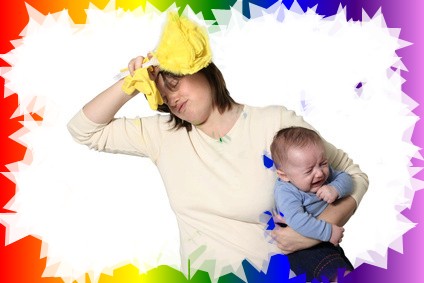What is ADHD in Adult Women?
A health article about ADHD in Adult Women from Your Health Online the A to Z directory of dealing with Health Problems & nutritional Self Care Strategies

ADHD in adult women is a recent phenomenon has been brought on by social media: adult women wondering if they might have ADHD.
Social media users have found a community who shares what it’s like living with ADHD.
Instead of thinking ADHD only affects a small percentage of the female population, many female viewers resonate with what they see.
Many women go undiagnosed with ADHD until their teens or into adulthood.
In many cases, women don’t get a proper diagnosis until they’re in their late thirties or early forties.
Women who get diagnosed later in life miss out on early intervention resources, and many women may not have the time, money, or energy to get a diagnosis later in life, even if they suspect they may have ADHD.
This eBook hopes to help women with ADHD better understand what it is, how it might look differently in women, and how they can manage their ADHD with practical tips and strategies.
Some of the common symptoms of ADHD in Adult Women
ADHD, or Attention Deficit Hyperactive Disorder, is the number one mental disorder affecting children and many adults.
It’s most likely to be noticed in children because they’re still going through developmental stages, and an adult who has had ADHD their whole life may have learned to deal with the symptoms associated with ADHD.
In theory, it may be possible to outgrow ADHD, but it’s more likely that an adult with ADHD is still experiencing symptoms of the disorder but has simply learned to live with it.
Types of ADHD in Adult Women

The Three Types of ADHD
ADHD is characterized as either a combination of inattentiveness and hyperactivity or one or the other.
There are three main types of ADHD which are:
● ADHD Combined Type.
ADHD Combined Type is the most common form of ADHD.
Individuals with Combined Type will have both inattentive and hyperactive behaviors.
● ADHD Inattentive Type.
The Inattentive Type of ADHD is when a person has trouble remembering things, is easily distracted, or struggles to follow directions but does not have the classic characteristics of hyperactivity.
● ADHD Hyperactive Type.
Someone with Hyperactive ADHD might act impulsively, struggle to sit still, or talk a lot.
They will not have issues with forgetfulness or have trouble focusing.
Of the three types, this one is the rarest.
What Causes ADHD in Adult Women

The specific cause of ADHD is unknown, but there is a strong genetic correlation.
Medical News Today writes, “A person whose parents or siblings have ADHD has a higher risk of experiencing symptoms.”
The same article says that genetics may play a role, but scientists have not found a specific gene indicating whether someone will develop ADHD.
In addition, people who have a parent or sibling with ADHD will not necessarily develop ADHD.
For instance, in a twin study, there is not a 100% chance that identical twins will both develop ADHD, although there is a 74% -80% chance that twins will both have ADHD.
That may indicate that there is an environmental correlation to ADHD. Some potential risk factors for ADHD include:
● Exposures to toxins
● Premature birth
● Maternal drug or alcohol use
● Head injury
It’s most likely that there is a genetic predisposition to ADHD that several environmental factors may contribute to that increase the risk of developing ADHD.
In an article entitled “What causes attention deficit hyperactivity disorder?” published in Archives of Disease in Childhood shares,
…results suggest that for ADHD there are more likely to be multiple environmental risks, each of small effect, with the overall burden of these risks remaining similar over time and between countries.
Some of these risk effects might be modified by genetic influences (gene-environment interaction).
The Neuroscience of ADHD

Those are the possible causes of ADHD, but what is happening in the mind and body of a person with ADHD?
What makes them hyperactive or inattentive, or both?
What makes them forget their keys or need to fidget?
In the online publication ADDitude, doctor Larry Silver writes, “Brain scientists have found that deficiencies in specific neurotransmitters underlie many common disorders, including anxiety, mood disorders, anger-control problems, and obsessive-compulsive disorder.”
He further writes, “ADHD was the first disorder found to be the result of a deficiency of a specific neurotransmitter — in this case, norepinephrine.”
Norepinephrine and dopamine are the neurotransmitters you’ll likely hear the most about with ADHD – dopamine being the chief one.
Low levels of these neurotransmitters are thought to cause many of the symptoms of ADHD.
Norepinephrine helps the brain focus, and it can make the brain and body feel more alert.
Dopamine is called the reward center of the brain, and it’s also responsible for memory, motivation, movement, and learning.
Low norepinephrine may lead to:
● Depression
● Anxiety
● Low blood sugar
● Problems sleeping
● Trouble focusing or keeping attention
Low dopamine may lead to:
● Feeling tired
● Lack of motivation
● Moodiness or anxiety
● Low sex drive
● Trouble concentrating
Besides having a low level of dopamine, people with ADHD may have a high level of something called dopamine transporters.
These dopamine transporters are responsible for removing dopamine from the brain, and there is a possibility that they are too efficient.
Gulf Bend Center, a mental health and intellectual & developmental disability center located in Texas, describes it this way:
Individuals with ADHD seem to have an excessively efficient dopamine-removal system.
They have a higher concentration of dopamine transporters called re-uptake inhibitors.
When dopamine is removed too quickly, it doesn't have sufficient time to exert its effect.
Researchers now believe that this overly-efficient transporter process may help to explain some ADHD symptoms.
Many people with ADHD feel like they’re always “chasing dopamine.”
That’s a possible reason why people with ADHD constantly feel the need to engage or to be stimulated in some way.
Why Girls and Women Go Undiagnosed With ADHD

In the 1990s and earlier, scientists and specialists believed boys were likelier to have ADHD than girls.
Studies showed that for every three boys with ADHD, one girl would have it. Some studies even put that ratio at 9:1.
Since then, researchers believe that number is far closer together. Meaning boys and girls experience ADHD at a more equal rate.
According to WebMD, “Most women with ADHD get an accurate diagnosis in their late 30s or early 40s.”
The American Psychological Association (APA) echoes this sentiment.
An article published in the APA quotes psychologist Kathleen Nadeau, Ph.D. stating, “One of the most common pathways to a woman being diagnosed is that one of her children is diagnosed. She begins to educate herself and recognizes traits in herself.”
If girls are just as likely as boys to have ADHD, why aren’t many women finding out about their ADHD until their thirties or forties?
Why are boys so much more likely to be diagnosed with ADHD?
The reason is that men and women, and girls and boys, often exhibit ADHD differently.
Girls are more likely to display the inattentive symptoms of ADHD, while boys are more likely to have hyperactive or impulsive symptoms.
In a classroom setting, a boy who is distracting the class or unable to sit during lessons will probably get more immediate attention and help than a quiet girl who forgets to do her homework or has trouble organizing her belongings.
That’s not to say that every boy or girl exhibits ADHD the same way.
Many girls do exhibit the hyperactive side of ADHD, and boys only display inattentive symptoms, but the trend tends to be more one way than the other.
Another reason that this happens is girls may be diagnosed with something other than ADHD, such as mood disorders, anxiety, or depression.
While they may have signs of depression or anxiety, treating doctors may have missed the underlying reason, which is ADHD.
Late or underdiagnosis of ADHD in women can have long-term negative side effects.
Dr. Arthur Robin, a professor of psychiatry and behavioral neurosciences and pediatrics at Wayne State University in Detroit, says:
“The adult women with ADHD I encounter in my practice feel like something is wrong with them.
They feel like second-class citizens with poor self-esteem, and they often try to hide their difficulties and true natures from others.”
What Are Some Differences Between Boys and Girls and ADHD?

It would be wrong to give a blanket statement that said all boys or all girls with ADHD act a certain way, but there are some tendencies that are often different between the genders.
Girls With ADHD Often Internalize Their Symptoms
Girls often have an internal sort of ADHD. Medical News Today writes, “Research indicates that while most boys with ADHD tend to express their frustration physically and verbally, girls are more likely to internalize their anger and pain.”Girls With ADHD May Have Anxiety and/or Depression
Girls with ADHD may be more prone to having anxiety and depression, and the longer they go without a diagnosis, the more likely they are to develop these comorbidities.
Although anxiety and ADHD are two very different diagnoses, they often run together, and one can exacerbate the other.
For this reason, girls with ADHD are often diagnosed with anxiety or depression, but their ADHD goes undiagnosed or takes a long time to diagnose.
Girls With ADHD May Suffer From Low Self-Esteem
Because girls with ADHD often struggle internally, they may have low self-esteem, especially when trying very hard to keep up but feeling like they’re never quite hitting the mark.
Many girls may perform well academically, making it even harder to diagnose since many children get a referral for an evaluation in a school setting.
Girls Are More Likely to Have Inattentive ADHD
There is no one way that girls and boys express ADHD. There are many similarities between the two, but boys are more likely to express the hyperactive type of ADHD, while girls are more likely to present the inattentive symptoms of ADHD.
While many girls have hyperactive tendencies, they are more likely to have the inattentive form of ADHD.
That means that they may struggle with things like:
● Staying on task or keeping track of homework assignments
● Keeping work areas organized
● Daydreaming during class time
● Running late or having trouble staying on a schedule
● Making friends or maintaining relationships
Girls that are hyperactive will still often display it differently than boys.
Signs of hyperactive type of ADHD in girls is:
● Enjoying physical activity
● Always in motion in one way or another
● Talkative or overly chatty
Patricia Quinn, M.D., director of the National Center for Gender Issues and ADHD in Washington, D.C., says:
“In a classroom setting, a boy might continually blurt out answers or repeatedly tap his foot, whereas a girl might demonstrate hyperactivity by talking incessantly.
A girl who talks all the time is often viewed by the teacher as chatty, not hyper or problematic — and thus is less likely to be recommended for an evaluation.”
Girls With ADHD May Be Better at Masking Symptoms
Girls with ADHD often work very hard to mask their symptoms, making it more challenging for specialists to diagnose their condition.
For example, a girl with ADHD may work extra hard or spend a long time doing schoolwork to compensate for their difficulties.
VeryWell Mind describes masking this way, “ADHD masking is a way of hiding symptoms through learned behaviors that can be healthy or unhealthy.
Many people with ADHD break social rules through their behaviors and may face shame and ridicule.
As a result, they develop coping strategies to hide parts of themselves.”
Masking symptoms may look like this:
● Taking notes on every chapter of a test in order to perform well
● Studying longer than other students to receive good grades
● Checking and rechecking assignments in order not to miss something important
● Trying to appear calm on the outside when internally the person feels stressed, nervous, or experiencing racing thoughts
● Attempting to conceal feelings
● Overcompensating for having trouble showing up on time to places by showing up extra early
● Writing everything down so things aren’t forgotten due to memory issues
● Taking on extra things even when it feels overwhelming in order to compensate for feelings of insufficiency caused by ADHD
● Working until exhaustion to try to convince others they’re capable, even if internally they feel the opposite
● Mimicking behaviors and social norms of others in order to fit in
Girls and women sometimes have better-coping strategies than boys, but the tendency to mask is slightly different and can often come with problems.
Besides missing an ADHD diagnosis, additional issues can arise from prolonged masking, such as fatigue, anger, burnout, or general irritability.
Signs of ADHD

ADHD in adulthood will have similarities to childhood ADHD, but instead of having those issues in a school setting, they’re in a work and home life setting.
An adult woman with ADHD may believe that certain things, such as being spacey
or chatty, are character traits rather
than a symptom of a disorder.
Women with ADHD may experience these symptoms:
●
Trouble with time management
●
Difficulty keeping things organized even with a
great deal of effort
●
Failure to remember appointments
●
Feelings of guilt for not being able to be a better
mother, partner, employee, or friend
●
Feeling that you’re letting people down because it’s difficult to remember important dates or events or you
may feel overwhelmed taking on the same level of contribution as other women
●
Wanting to avoid social gatherings for fear that
you’ll say or do the wrong thing
●
Struggling to stay focused at work when there
are a lot of distractions around
●
A desk that is disorganized or covered with
papers
●
Despite working hard to keep the house or
workspace clean, it may still be messy or may become messy quickly after
cleaning it up
●
Overspending is a common sign of ADHD. Women
with ADHD may try to make up for missing something important by buying
something expensive for a friend or loved one
●
Feeling overwhelmed or stressed at the store,
and may take a long time to go grocery shopping and still forget key items
●
May not want people to come over because the
house is perpetually a mess
●
General feelings of being overwhelmed and
incapable of keeping up with life’s demands
●
May want to change jobs or hobbies often
●
Doing things like leaving notifications on your
phone so you don’t forget to respond to someone or holding off going to
the bathroom when you’re doing something so you don’t get distracted by another task
●
Emotional dysregulation
● Living in the moment and thinking that everything in the moment is how it will always be
Additional Terms and Symptoms Associated With ADHD
There are some other terms that you may hear about that are associated with ADHD.
Here we will briefly explain each of them as they are common in people who have ADHD.
What Is Rejection Sensitive Dysphoria?
Rejection Sensitive Dysphoria, or RSD, is a common reaction people with ADHD have to criticism or perceived criticism.
RSD is not a clinical diagnosis but a way of describing something that can happen to people with ADHD.
As a simple explanation, people with ADHD often have difficulty hearing or accepting criticism or rejection.
People with RSD may use masking tendencies to overcome their perceived shortcomings, avoid social settings, or shy away from challenges where they are afraid they will fail.
Other signs of RSD may be:
● Becoming easily embarrassed
● Becoming angry or having an emotional outburst in response to rejection or criticism (real or imagined)
● Low self-esteem
● Strong fear of rejection
● Believing someone means to criticize even when they are not
● People-pleasing tendencies
● Perfectionism What Is Time Blindness?
Time blindness is an issue for many people with ADHD, which means they have difficulty keeping track of time.
If they become invested in a certain activity, they may spend many hours doing it without realizing that time has passed.
Time blindness means that a person doesn’t feel or notice the passing of time.
Most people are able to sense the passing of time like they can sense smell, taste, or touch.
For many people with ADHD, this sense of time is not present.
When people with ADHD don’t notice time passing, it can often seem to others as though they are irresponsible or that they don’t care about someone else’s time, but it’s a sensory processing issue, not a lack of responsibility.
Many people with ADHD who experience this have difficulty estimating how long something will take.
They may think a project will take twenty minutes to complete when it takes them hours. They may think they have extra time to get ready to go somewhere when they do not.
It’s also common for people with time blindness to overcompensate by going to things exceptionally early so people don’t suspect them of being disrespectful or irresponsible.
One review published on PubMed Central explains:
“Practical approaches to time perception and its evaluation have shown that individuals with ADHD have difficulties in time estimation and discrimination activities as well as having the feeling that time is passing by without them being able to complete tasks accurately and well.”
Although ADHD has been associated with neurologic abnormalities in the mesolimbic and dopaminergic systems, recent studies have found that when individuals with ADHD are treated medically, their perception of time tends to normalize.
A blogger named Jaclyn Paul describes time blindness as being similar to being colorblind. In a post entitled “How it really feels to be time-blind with ADHD” she writes:
A colorblind person can’t perceive differences between certain hues.
They know those differences exist — and other people can see them.
A time-blind person may know we should look at a clock more often, or leave work in time to meet a friend for drinks.
That knowledge doesn’t help us when we forget the clock, and maybe time itself, exists at all.

What Is Hyperfocus?
A lot of people believe that a person with ADHD is incapable of focusing on something, but in reality, many people with ADHD have the ability to focus on something of interest for a great deal of time.
This ability is often called “hyperfocus, " which means that a person can become completely absorbed with a thought or task while ignoring everything else around them.
When people with ADHD are children, you may find that they can sit and play video games or watch TV for hours and hours.
Adults may do this as well, or they may have something else that preoccupies their attention.
An article published in PubMed Central called “Hyperfocus: the forgotten frontier of attention” shares:
“Hyperfocus, broadly and anecdotally speaking, is a phenomenon that reflects one’s complete absorption in a task, to a point where a person appears to completely ignore or ‘tune out’ everything else.
It is generally reported to occur when a person is engaged in an activity that is particularly fun or interesting.”
Hyperfocus can contribute to time blindness, as people with ADHD become extremely involved in something they’re interested in and completely lose track of time.
In children, it can often be difficult to get them to go from one preferred activity to a non-preferred activity.
For example, if they’re really into a video game, they may melt down or overreact when you ask them to stop to do their homework or take a bath.
For adults, switching from something they’re engaged in to something they’re not can also be difficult.
Blogger and ADHD coach Jacqueline Sinfield describes it this way:
“Adults with ADHD can find transitions difficult, as it requires a large amount of energy and effort to disengage from one activity and move attention to the next. Changing gears like this and shifting focus can leave you feeling irritated, fatigued or scattered.”
Some people describe hyperfocus as something like a superpower because the person with ADHD can dial in on a task and complete it with extreme focus.
In some cases, people with ADHD might put off work or school assignments until the last moment, and then when the pressure to finish it kicks in, they’re capable of hyper-focusing and doing an incredible job.
While there can be benefits to hyper-focusing, it can also come with problems. Besides time blindness, hyperfocus can make it difficult for someone with ADHD to tend to other important life tasks.
A person caught in a hyperfocus moment may not pay attention to anything around them, even if coworkers or family members need their attention.
They may also do a poor job with self-care, forfeiting things like eating or sleeping to continue focusing on something.
Hyperfocus can happen for productive things like work or school, but it can also occur for non-productive things like television or video games which become a time suck for other important activities.
What Is ADHD Fatigue?
Having ADHD and navigating life like a neurotypical person can be physically and mentally exhausting.
In an article posted in ADDitude, a writer explains what ADHD fatigue feels to her, “It’s like my car battery.
If I leave my car lights on overnight, the battery will use all of its energy to keep them burning, but will eventually run out of power.
Once I jump-start it, the battery will recharge with regular, smaller ‘boosts’ generated by the engine.”
In addition to trying to keep up with life as a person with ADHD, it’s also common for people with ADHD to have trouble sleeping.
The Sleep Foundation writes,
Beginning around puberty, people with ADHD are more likely to experience shorter sleep time, problems falling asleep and staying asleep, and a higher risk of developing a sleep disorder.
Nightmares are also common in children with ADHD, especially those with insomnia.
Sleep problems in ADHD tend to increase with age, though sleep problems in early childhood are a risk factor for future occurrence of ADHD symptoms.
Many people with ADHD also have anxiety as a comorbidity, which can lead to sleep issues and fatigue.
Heathline explains, “Anxiety can cause you to lose sleep, either because you have trouble falling asleep when you first lie down, or because worries wake you up when you’d otherwise be sleeping.
If that’s the case, you may be feeling extra tired during the day.”
Dopamine is another possible cause of fatigue in people with ADHD. Medical News Today writes,
Dopamine plays an important role in motivation, reward, pleasure, emotional regulation, and executive function.
Low motivation or a low sense of reward from completing tasks may cause tasks to feel more exhausting.
Also, decreased executive function can make it more difficult for a person to plan and organize their life, contributing to a sense of chaos that may cause feelings of overwhelm and fatigue.
ADHD Perfectionism
Some people with ADHD will push themselves to the max, trying to manage their life and not let their ADHD show in their daily tasks.
They will take on extra responsibilities to show they aren’t incapable and to hide their ADHD from others.
This relates to the “masking” we discussed earlier.
In order to keep up with life demands, they have to work extra hard.
For instance, a person with ADHD likely has memory problems, so they try to overcompensate for this problem by working trying twice as hard to become organized.
An article in ADDitude entitled “Is ADHD or Anxiety to Blame for My Perfectionism?” shares,
Perfectionist adults with ADHD live in fear of failing to meet the standards they set for themselves in comparison to neurotypical peers, especially if they’ve struggled to meet those goals in the past. Often these expectations are unrealistic based on “shoulds” instead of what folks actually can do.
A person with ADHD and anxiety may also try to control every possible scenario.
This requires additional commitment, meaning that a person with ADHD may spend many hours doing something so others don’t think they’re a failure.
People with ADHD who are perfectionists may keep teachers, bosses, and friends from knowing they have ADHD, but it can often lead to fatigue and burnout.
Pushing through to the point of exhaustion has drawbacks on a person’s mental and physical well-being.
How ADHD Might Affect Women Differently & Tips To Deal With It.

ADHD is usually a lifelong disorder, but there are things that you or a loved one can do to manage it.
Here are some quick tips for managing ADHD as an adult woman.
1. Get diagnosed.
If
you’re an adult woman and you suspect that you have ADHD, go
to a specialist to get a proper diagnosis. Once you’re working with a specialist, they
can help you determine the best course of action.
2. Get medication if it’s necessary.
Many women report that a mix of medication and strategies can
greatly improve the impact of ADHD.
3. Hire a house cleaner.
If there are certain tasks that seem impossible to keep up with, try passing on some of that work to paid help.
This is not a possibility for every budget, but
it may even be worth taking on a side hustle or part-time job that you love to
make some extra change to help pay someone to keep your house clean.
4. Be patient and loving to yourself.
You didn’t give yourself ADHD and you’re not responsible for the difficulties that it gives you in life. Let go of the guilt and shame you’re feeling from ADHD.
Be patient
with yourself when things are extra hard or when you don’t feel like you’re stacking up. You’re likely doing a lot better than
you’re giving yourself credit for.
5. Don’t take on more than you can (realistically) handle.
Don’t try to make up for your ADHD by taking on extra responsibilities.
You don’t have to apologize for who you
are; you don’t have to do MORE to try to cover for your ADHD.
6. Follow social media accounts and podcasts about ADHD.
There is a ton of helpful information
on podcasts and social media accounts talking about ADHD and specifically ones
geared toward women that can not only provide important information but also
help you feel like you’re part of a community of women.
7. Practice mindfulness.
Learning to slow down and think about what you are doing and what your needs
are is an important practice for people with ADHD.
WebMD shares, “Research
now shows that mindfulness meditation -- where you actively observe your
moment-to-moment thoughts and feelings- -- may also be a good way to calm your
mind and improve your focus.”
8. Stick to routines.
People with ADHD notoriously struggle to stay organized. To combat this, try to use systems in your house to make life easier.
For example, toss it in the trash
can as soon as you get junk mail in the mail.
Have a place in the house for important bills where you always
put them. Always keep your keys in the same location.
Many people with ADHD will start a planner or try to get organized and then forget where they put their planner or will forget to write in it.
Instead, have a calendar or planner that stays in one place.
When an important event is coming up, remember to write it down immediately.
The Sum Total With
Women and ADHD

If you’re a woman with ADHD or you suspect you might have ADHD, know that you are not alone in that experience.
Four percent of the adults in the US are diagnosed with ADHD, a statistic that is probably much lower than it should be when you account for those who have not been diagnosed (specifically women).
Your ADHD does not define you, but it does affect you.
There will be parts of your life that are more difficult because of ADHD, but there will also be parts of your life that are beautiful and unique.
Many people with ADHD are creative, exciting, and adventurous people who lead interesting lives.
People with ADHD would rather spend the day exploring the world than washing the dishes, but they can also work very hard to get things done when necessary.
People with ADHD are often amazing problem solvers and can be calm and collected in a crisis.
People with ADHD can often be great conversationalists, courageous, spontaneous, and resilient.
You’ll often find some of the most successful entrepreneurs are people with ADHD because they’re incredible at generating ideas, and the excitement of something new continually motivates them.
One of the most important things for women with ADHD to recognize is that you don’t need to feel shame for having ADHD.
It’s okay to be open and transparent with friends, family, coworkers, and others that certain things may be hard for you.
You may need extra reminders for tasks.
You may need time to ensure you understand the tasks given to you before you can proceed.
Moms with ADHD can also benefit from being open and honest with their coparent, and letting them know that they need help with the day-to-day responsibilities of parenting.
Days, weeks, or years that feel monotonous can be extra difficult for a mom with ADHD, so schedule breaks or times to do fun and non-parent-related things.
If your budget allows for it, you might even want to hire someone to watch your kids occasionally.
Most importantly, if you think you have ADHD but are not diagnosed, try contacting a specialist to take an assessment.
If you do have ADHD, you can make an action plan with your therapist to figure out the best solution for you.
Vitamin & Nutrient Associations

Even when we try to eat well, we're disadvantaged. The nutritional
content of most food has been compromised over the years, not only by
deficient soils and modern production, transportation, storage and
processing methods, but also by the enormous amounts of chemical and
artificial substances added to promote growth, storage life, taste and
appearance.
It's for this reason that more and more medical authorities are
advocating the use of vitamin and mineral supplements. However, finding
them in the right combination can be both confusing and costly.
The nutrition products I am going to recommend you make use of knowledge
gained from the botanical world's 6,000 year history. They incorporated
health building nutritional herbs with the best modern technology to
help our bodies cleanse and detoxify so that the cells - the tiniest
living units - can be as fully nourished as possible.
This allows the cells to grow,
repair and to perform their functions with the best possible efficiency
so that we feel and look better and are more able to prevent and fight
disease. Once the body begins to clear itself of toxins it can more
efficiently absorb nutrition.
Further reading through our articles on health issues will give
you a body of information that will help you decide what options you
have to deal with the underlying causes of your problem through giving
your body the nutrition products that will assist you body to heal from
the inside out.
You can visit our health food products page here: Herbalife Health Nutrition Supplements and learn more about our core nutrition program, the Cellular Nutrition Advanced Program and also check out these targeted products, Florafiber to replace your healthy flora and Aloe Vera Juice to help cleanse your system.
Also using NouriFusion Skin Essentials will clearly help provide you with excellent skincare support for your ‘outer nutrition’.
We wish you well in your search for solutions to this problem and your movement towards better health in all areas.
More Resources available about ADHD in Adult Women
Below here are examples of Health Success
Results other people have had with using a self care strategy for
dealing with this condition:
We would be very interested to hear your result stories with your problem if you are using some of our nutrition products. To send us your story just fill out the form below.
https://chadd.org/for-adults/symptoms-of-adhd-in-women-and-girls/
https://www.additudemag.com/overwhelmed-mom-with-adhd/
https://www.webmd.com/add-adhd/adhd-in-women
https://www.verywellhealth.com/adhd-in-women-common-signs-and-symptoms-5211604
https://www.verywellhealth.com/do-adhd-symptoms-differ-in-boys-and-girls-5207995
https://www.additudemag.com/slideshows/add-vs-adhd
https://www.cdc.gov/ncbddd/adhd/facts.html
https://www.webmd.com/add-adhd/childhood-adhd/attention-deficit-hyperactivity-disorder-adhd
https://www.medicalnewstoday.com/articles/adhd-hereditary#genetic-condition
https://adc.bmj.com/content/97/3/260
https://www.youtube.com/watch?v=CniuZ0sQPeA
https://www.everydayhealth.com/norepinephrine/guide
https://my.clevelandclinic.org/health/articles/22588-dopamine-deficiency
https://www.gulfbend.org/poc/view_doc.php?type=doc&id=13861
https://adhdfoundation.org.au/wp-content/uploads/2020/06/Dopamine.pdf
https://www.ncbi.nlm.nih.gov/pmc/articles/PMC3827008/
https://www.healthline.com/health/adhd/adhd-symptoms-in-girls-and-boys
https://www.webmd.com/add-adhd/anxiety-adhd-link
https://www.ncbi.nlm.nih.gov/pmc/articles/PMC4195638/
https://www.verywellmind.com/what-is-adhd-masking-5200863
https://chadd.org/adhd-news/adhd-news-educators/gender-myths-adhd/
https://www.additudemag.com/adhd-in-girls-women/
https://www.verywellmind.com/adhd-in-girls-symptoms-of-adhd-in-girls-20547
https://www.mayoclinic.org/diseases-conditions/adult-adhd/symptoms-causes/syc-20350878
https://www.additudemag.com/rejection-sensitive-dysphoria-and-adhd
https://www.medicalnewstoday.com/articles/adhd-rejection-sensitive-dysphoria#symptoms-of-rsd
https://adhdonline.com/time-blindness-and-adhd
https://www.verywellmind.com/causes-and-symptoms-of-time-blindness-in-adhd-5216523
https://chadd.org/adhd-in-the-news/what-is-time-blindness-and-do-you-have-it/
https://adhdhomestead.net/time-blindness-feels/
https://www.ncbi.nlm.nih.gov/pmc/articles/PMC6556068/
https://adhdhomestead.net/time-blindness-feels/
https://www.webmd.com/add-adhd/hyperfocus-flow
https://untappedbrilliance.com/adhd_and_transitions/
https://www.additudemag.com/hyperfocus-symptoms-positives-negatives-strategies/
https://www.additudemag.com/adhd-fatigue-syndrome-run-down-by-add-symptoms/
https://www.sleepfoundation.org/mental-health/adhd-and-sleep
https://www.medicalnewstoday.com/articles/can-adhd-make-you-tired#can-adhd-make-you-tired
https://www.additudemag.com/adhd-and-perfectionism-anxiety
https://chadd.org/adhd-weekly/the-complete-picture-how-estrogen-affects-women-with-adhdhttps://chesapeakeadd.com/home/education-and-training/articles/life-management-tools-for-women-with-adhd/
Share *YOUR* remedy & health success story!
We are on a world-wide mission to source and tell our readers about as many as possible of the natural remedies & self care strategies available, so please help us to grow and improve our health information on this subject.
If you have a proven home remedy or natural treatment or have a great Health Success story, we would love to share it with our readers.
And as a special "Thank You" for your contribution, we will give you our special edition "Health Success Report"!
(When you submit this article you agree to the ***GENERAL RELEASE below this form)
See below here what stories & resources have been contributed on this subject:
Click below to see contributions from other visitors to this page...
A Guide to Impulse Control for Adult Women with ADHD
Impulsivity is one of the most common symptoms of ADHD. It’s also one of the most difficult to manage.
While any adult might sometimes act without thinking, …
A Self-Care Guide for Adult Women with ADHD
While medication and talk therapy can help you manage the symptoms of ADHD, daily habits pay a big role too. Regular doses of skillful self-care can boost …
Dealing with ADHD at Work
Does your boss keep giving you the same feedback? You need to follow instructions and pay more attention to details. These could be signs that you have …

*** GENERAL RELEASE AND ASSIGNMENT
For good and valuable consideration, the receipt
and legal sufficiency of which is hereby acknowledged, I ("I", "me",
"my") hereby agree as follows:
1) I hereby grant to Warren Tattersall, his successors, assignees and
licensees the unlimited right, but not the
obligation, to use any statements made by or attributed to me (my
"Statements") as well as my name, voice, and likeness, performance,
personal characteristics and other identifying information (jointly and
severally with the Statements and the photographs referenced in
Paragraph 2 below, my "Personal Characteristics") in and in connection
with the advertising, promotion, marketing and other exploitation of
Herbalife products or Warren Tattersall’s services in any and all
languages and media, now known or hereafter devised, throughout the
universe in perpetuity.
2) If I supply Warren Tattersall with photographs of myself on this date
or any date subsequent, I agree that Warren Tattersall may use such
photographs to the full extent provided above, I warrant and represent
that I am the person depicted in the photograph, I am the owner of the
photograph, I have the authority to grant the permission and rights
granted herein, and no one else’s permission is required to grant such
rights, and I understand that the copy of the photograph(s) I supply to
Warren Tattersall will not be returned.
3) I understand that Warren Tattersall is not obligated to use my
Personal Characteristics as permitted herein or, if commenced, to
continue with such use in any territory. I acknowledge and agree that
Warren Tattersall may make my Personal Characteristics available to
Warren Tattersall’s independent distributors to use as permitted above.
4) In undertaking the act of submitting my words and images through
www.TheHealthSuccessSite.com I understand that I am agreeing the terms
and conditions of this agreement
I have read this entire General Release and Assignment and fully
understand his contents. I likewise understand that this document shall
remain in full force and effect unless/until I request that it be
terminated, and that any such request must be made in a signed writing.
By signing below, I hereby acknowledge and agree to the
foregoing.
I understand that in submitting my material for publication I am granting the rights to reproduce this material on the internet or in other form and I have read the conditions above
BACK TO “Your Health Online”
the A to Z directory of dealing with Health Problems & Self Care Strategies for natural remedies to your health issues.
Terms of Use | Privacy Policy | Disclaimer | Site Map
====================================================
SITE DISCLAIMER: Do these products “cure” anything? Of course
not… but it stands to reason that if you cleanse your body and feed it
the finest nutrition available, giving it everything it needs in
balance, on a daily basis, that your body will do what nature intended,
and give you the best possible chance to fend off sickness and disease.
This ADHD in Adult Women information is not presented
by a medical practitioner and is for educational and informational
purposes only. The ADHD in Adult Women content is not
intended to be a substitute for professional medical advice, diagnosis,
or treatment. Always seek the advice of your physician or other
qualified health provider with any ADHD in Adult Women
questions you may have regarding a medical condition. Never disregard
professional medical advice or delay in seeking it because of something
you have read.
The ADHD in Adult Women resources on this site are not intended to be a substitute for professional advice. While all attempts have been made to verify ADHD in Adult Women information provided in this publication, neither the author nor the publisher assumes any responsibility for errors, omissions or contrary interpretation of the web site ADHD in Adult Women subject matter herein.
The site ADHD in Adult Women contents are solely the opinion of the authors and should not be considered as a form of advice, direction and/or recommendation of any kind. If expert advice or counseling is needed, services of a competent professional should be sought. The author and the Publisher assume no responsibility or liability and specifically disclaim any warranty, express or implied for any ADHD in Adult Women products or services mentioned, or any techniques or ADHD in Adult Women practices described.
The purchaser or reader of this ADHD in Adult Women publication assumes responsibility for the use of these materials and information. Neither the author nor the Publisher assumes any responsibility or liability whatsoever on the behalf of any purchaser or reader of these KEYWORD nutritional supplements materials. There is no guarantee of validity of accuracy. Any perceived slight of specific people or organizations is unintentional.
This website and its
creators are not responsible for the content of any sites linked to.
Since natural and/or dietary supplements are not FDA approved they must
be accompanied by a two-part disclaimer on the product label: that the
statement has not been evaluated by FDA and that the product is not
intended to "diagnose, treat, cure or prevent any disease."
====================================================
the A to Z directory of dealing with Health Problems & Self Care Strategies for natural remedies to your health issues.

Subscribe to get your weekly "Health Success Magazine" with a new complete & comprehensive Health Report in every edition!

to “Your Health Success”
our weekly F’R’E’E’ Newsletter
If you would like a free no-obligation private consultation or to contact Warren Tattersall for more information, please click here >> Contact Us



